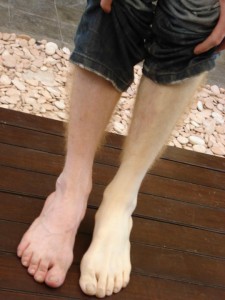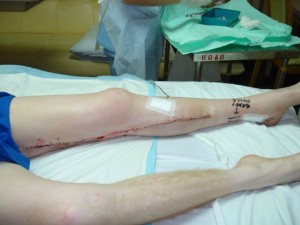
Insurance companies. Tossers aren’t they? Slippery, mendacious, faceless behemoths who are quick enough to take your premiums but equally quick to wriggle out of their obligations should you be unfortunate enough to need to claim. All, arguably, valid statements but having heard the story of my flatmate Greig and his recent ill-fated trip to Bali, I’ve started to appreciate that one day an insurance company might just save your life.
The story begins in the heady days of the summer of 2008. Shoppers were busy indulging in the last days of credit-fuelled hedonism prior to the economy imploding, Gordon Brown (remember him?) was busy enjoying his short-lived political honeymoon and Greig was busy getting kicked by a horse. The horse in question had already been responsible for breaking several of Greig’s brother-in-law’s ribs in a previous assault which, to my mind, makes it a prime candidate for a trip to the glue factory but they seem to be more tolerant of these equine misdemeanours in Scotland.
Anyway, using the sort of logic whereby you deal with an alarming noise coming from your car’s engine by turning up the stereo to drown it out, Greig chose to ignore the pain in his leg which began that day and never truly subsided; a ticking medical time-bomb that ultimately nearly proved fatal.

Fast forward two-and-a-bit years and Greig is in Bali, enjoying the last day of a week’s holiday with his friend Vivian in a restaurant. It had been an enjoyable few days and Greig and Vivian were busy taking some final pictures before flying back to Australia that evening. At one point Greig crouched down on his knees to take a photograph from a slightly different angle and found that he had some difficulty getting back on his feet again. He also noticed that one of his legs had turned completely white. It’s worth pointing out that Greig is a ginger Scottish man so the fact that the lightening of his skin colour was noticeable was a cause for immediate concern. The change in skin tone was accompanied by a shooting pain in his lower leg and after a few minutes of procrastination, they decided that a trip to hospital was required and jumped into a taxi.
The first doctor they saw took one look at Greig’s leg, shuddered and sent him off to a better hospital, after relieving them of £200 for the consultation, naturally. This was the first of many, many medical expenses; initially Greig and Vivian were able to settle them on their credit card but, for reasons that will soon become apparent, the insurance company had to step in and this is the reason for my Damascene conversion to their virtues.
At the second hospital Greig underwent two ultrasound scans (£500 each) which identified a blood clot in his left leg that was apparently causing the flow of blood to be restricted to his calf and foot. They immediately diagnosed deep vein thrombosis and put Greig on a course of Warfaran (£250 per day), a coagulate which, it was hoped would thin the blood and dissolve the blood clot.
This was obviously a major inconvenience especially as Greig clearly wouldn’t be able to fly until the clot had been cleared and certainly not that day but fortunately both Greig and Vivian were between jobs at the time so work was not an issue at least. They therefore accepted their fate; Greig was admitted to hospital (£550 per night) and Vivian returned to the hotel as they both prepared for a few more days in Bali.

Comically, three days after Greig began his stay in hospital, he had some well-needed company when Vivian was also admitted after suffering an unfortunate reaction to some hair dye. Laurel and Hardy have got nothing on those two.
Five days and another cancelled flight later, it became apparent that Greig was not responding to the treatment so the doctors ordered a CAT scan and things began to take a turn for the serious.
The doctor informed Greig that the CAT scan had identified an aneurysm on the back of his left knee and this was the actual cause of the restricted blood flow to his lower leg; this was the legacy of the horse-inflicted injury. The doctor informed him that this would need to be immediately removed or Greig risked amputation, paralysis or even death and, oh, the operation will be £10,000 which we need before we will start and, just to be difficult, we don’t accept bank transfers.
Prior to this Greig, in order to stop them worrying, had kept his parents in the dark with regard to his ongoing medical plight but this turn of events meant that he had little option now but to ring them and drop the bombshell. You can only imagine the reaction of Greig’s dad at the other end of the phone line upon hearing that his only son might at best be returning home with a wooden leg, at worst in a wooden box. Fortunately Greig’s parents are reasonably well off so were able pay the £10,000 on their credit card. Another hasty phone call to Scotland was made when, twenty minutes before the operation was due to start, the surgeon informed Greig that they would be undertaking a slightly different procedure than first anticipated and that the new procedure would be another £3,000.
Unfortunately it would appear while £13,000 may get you an operation in Indonesia, it does not necessarily guarantee a decent anaesthetist as Greig actually woke up mid-way through the surgery. He came round just as the surgeon was cutting the light-bulb sized aneurysm from his leg but, whilst he was conscious and could feel pain, he was still sufficiently anaesthetised to stop him alerting the medical staff. A situation that could literally be described as a waking nightmare.
To rub salt into the wound (not a standard medical procedure in Bali but it wouldn’t be a complete surprise), it quickly became apparent that the surgery had, in fact, been a complete waste of time (and, obviously, money). The basic premise of the operation had been to remove the aneurysm and then divert the artery, via an artificial plastic vein, to a working vein further down the leg and return the flow of blood to Greig’s foot. It doesn’t exactly take Quincy to work out that diverting the artery to a vein that is completely blocked with congealed blood is not going to work does it?
It was clear that they had reached the limits of medical ‘expertise’ in Bali and with Greig’s prognosis deteriorating by the hour, the decision was taken to transfer him to the nearest hospital that would be able to treat him with some degree of competence. Unfortunately the nearest such institution was in Singapore and Greig’s condition did not allow them the time to wait for the next charter flight so, naturally, a private jet was called for (£40,000)

and Greig headed swiftly to Bali airport. The patient was accompanied on this trip by fifteen different people including four whose sole occupation were to hold umbrellas over his stretcher whilst he was being loaded onto the plane as well as the obligatory nurse who, helpfully, instantly fell asleep the minute they were aboard.
Two hours later they arrived at the Mount Elizabeth Hospital in Singapore and Vivian (she was still with him at this point) asked the doctor if Greig would be allowed to fly home in the next day or so. The doctor looked at her quizzically before pointing out that there was still a very real chance that he could lose his leg, suffer major paralysis or even die.
The situation was still very much critical.
Another five hour operation followed in which the Singaporean surgeon attempted to remove the pointless plastic vein inserted in Bali and basically re-wire Greig’s left leg with veins removed from

his other leg. This time round the operation was much more successful or, more accurately, just ‘successful’ and Greig settled into the £5,000 per night intensive care to begin his recovery with his leg held together by 130 staples and 20 stitches.
The following period is slightly sketchy in Greig’s memory which he attributes to the major loss of blood he suffered at this time including one occasion where he was talking on Skype to his parents and failed to notice that his leg had completely opened up and blood was literally flooding out of it – the drugs prescribed at the time inhibited the ability of the blood to clot – and the first of two blood transfusions was swiftly administered. The second transfusion followed a slightly less sympathetic episode when Greig, against doctor’s orders went out drinking and the alcohol reacted unfavourably with the Warfaran causing another massive haemorrhaging of blood.
One month and £76,000 worth of Singaporean medical expenses later Greig was allowed to fly back to Australia with the conditions attached that he had to travel in Business Class and be accompanied by a nurse – total cost: £11,000.
The result of the injury and subsequent surgery is going to be with Greig long after the insurance company has paid up the total claim which will be in excess of £150,000: He now has to undergo six months of intensive physiotherapy, cannot have any exposure to cigarette smoke whatsoever and can only fly business class for the rest of his life as his leg must be kept elevated at all times when flying.
There’s two real morals to this story that I can see – as I always suspected horses are inherently malevolent and untrustworthy animals and secondly, whilst those two adjectives could also be applied to insurance companies, it’s well worth paying a bit more for a better policy. It’s a dangerous world out there.
